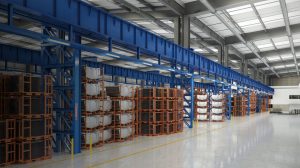June 28, 2019
How to lower energy bills, ease compliance woes, and increase productivity
Facility management is an increasingly complex job. Aside from ensuring physical safety, data security, and code compliance, there are ceaseless demands from upper management to save money. That’s a tall ask in itself, considering today’s soaring energy costs.
When it comes time to upgrade systems, it may be tempting to take the frugal approach, choosing products solely based on the price tag without pausing to consider long-term impacts. But meeting today’s challenges means investing in smarter, more scalable solutions that allow your facility to save far more money over time. In industrial settings, LED lighting is one such investment.
Why upgrade to LED lighting now?
LED lighting pays for itself in energy savings.
An investment in LED will save your facility money and pay for itself in as little as two years. By some estimates, upgrading to LED lighting can shave up to 70% off of your facility’s energy bill. When paired with features like occupancy sensors and automated controls, LED’s savings can be even greater.
See how much your facility could save with LED, check out our Energy Savings Calculator.
Improved light quality means improved safety and productivity.
A switch to LED can also help you avoid some everyday hassles that cost you not just money, but productivity. Older lighting systems can flicker or delay, especially in extreme conditions like food processing/ cold storage facilities. Poor light quality can lead to mistakes on the job, cause visual discomfort, and worst of all, leave your facility accident-prone
Today’s LED lighting solutions are designed for optical precision, featuring high CRI (color rendering index) light output; essentially, the ability to see an environment’s colors more accurately. So crucial is light quality to safety, regulatory agencies (like the FDA) now require minimum CRIs in some facilities. These minimum CRI requirements are likely to rise as lighting technology advances, so facilities who don’t upgrade could end up being noncompliant.
Then there are the “everyday” ways LED lighting helps boost worker safety. It can help you maintain more comfortable temperatures, thanks to bulb emissions that are up to 40% cooler than fluorescent. That also means lower fire hazards. Plus, more effective high bay lumen output can help curb accidents caused by poorly-lit areas.
Facilities can save on maintenance costs, too.
When light fixtures die in large industrial facilities, it’s a huge production to replace them because a lift is typically required. Besides the cost of the new lamp, there are equipment fees and liability from workers operating at height -- not to mention the productivity and resources that are drained during the process.
With LED, there’s no need to worry about replacing bulbs, since a single lamp can run for more than 10 years. The peace of mind alone is worth the investment for facility managers.
What type of LED lighting is right for my facility?
Every industrial application presents unique challenges, and there are plenty of LED solutions designed to address those needs. There are a number of fixtures and packages designed for high bay industrial applications, for example; we also offer a full line of sealed and gasketed products for harsh environments where standard light fixtures won’t cut it.
To explore your options and find the best fit, check out our easy-to-follow product selection guides for the top-used products in industrial facilities:
Industrial LED High Bay Selection Guide
Industrial LED Vaportite Selection Guide
Commercial LED Linear Selection Guide
Our experts can also help you find LED solutions that fit your needs and budget. Contact a Cooper Lighting representative today to learn more.

